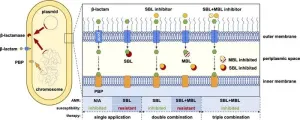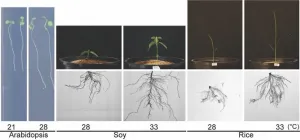(Press-News.org)
Australians are no strangers to long, hot summers, but new Griffith University research has looked at the impact of hot weather on patients with pre-existing chronic diseases and how it increases their risk of being hospitalised.
The research, recently published in eBioMedicine, found the risk of hospitalisation increased with the number of pre-existing chronic diseases during hot weather.
Individuals over the age of 65 with multimorbidity, defined as having two or more chronic diseases, were most at risk during hot weather.
Dr Zhiwei Xu from Griffith’s School of Medicine and Dentistry said as global temperatures continue to rise, this will have an impact on our hospital system.
“Worldwide, more than half of people aged over 60 years have multimorbidity,” Dr Xu said.
“Hospitals will face more patients with multimorbidity during those hot days, which is why it’s so important future iterations of jurisdictional heat early warning systems to include people with multimorbidity as a distinct heat-vulnerable group.”
Currently, people with chronic diseases are listed in the heat-vulnerable group, but those with multimorbidity are not classified as a distinct and vulnerable subgroup.
Dr Xu’s research focused on emergency hospitalisations between March 2004 and April 2016 for patients with chronic diseases including cardiovascular disease, diabetes, mental disorders, asthma/COPD, and chronic kidney disease.
During that time period, more than two million emergency hospitalisations were recorded, and when the mean temperature increased, hospitalisation odds increased significantly for patients with multimorbidity.
These findings highlight the additional strain that elevated temperatures can add to already stressed human body systems such as cardiovascular or kidneys.
“We know exposure to hot weather is detrimental to human health and well-being, and patients with multimorbidity typically require more comprehensive and integrated medical management than patients with one or no chronic disease,” Dr Xu said.
Dr Shannon Rutherford, a co-author on this paper, also co-leads Griffith University’s Ethos project, an extreme heat warning system for older Queenslanders.
“This new study feeds into the work Ethos has underway which aims to provide in-home solutions to allow older people and their carers to monitor heat exposure, identify heat risks in their home, and respond to those risks using accessible cooling strategies,” she said.
The paper ‘Multimorbidity and emergency hospitalisations during hot weather’ has been published in eBioMedicine.
END
It’s often said we can’t control the weather. But what if the weather controls how and when we invest our money? More specifically, what if the skies control how much we’re willing to gamble in the stock market?
New research by the University of South Australia has found a connection between pleasant weather conditions and higher investment in lottery-like stocks.
Lottery-like stocks are cheap compared to other stocks and, like lottery tickets, they can be seen as an opportunity to make a substantial gain. However, the chance of a higher return is minimal, and it’s therefore considered a high-risk investment. A study by UniSA finance researchers ...
In the ongoing battle against antibiotic resistance, a new study published in Engineering by Zhuoren Ling’s research team unveils a promising triple combination of antibiotics that significantly expands our arsenal against drug-resistant bacteria. Titled “The Triple Combination of Meropenem, Avibactam, and a Metallo-β-Lactamase Inhibitor Optimizes Antibacterial Coverage Against Different β-Lactamase Producers,” the research sheds light on a novel approach to tackle one of the most pressing global ...
LA JOLLA (June 4, 2024)—Global temperatures are on the rise, with experts projecting an increase of 2.7°F by 2050. Because plants cannot regulate their own temperatures, they are especially sensitive to these temperature changes. In higher temperatures, plants instruct their root systems to grow faster, creating long roots that stretch through the soil to absorb more water and nutrients. While this response may help the plants in the short term, new research suggests it’s both unsustainable for the plants and potentially ...
Researchers from The University of Texas at Arlington received 20 utility patents for their work in 2023, contributing to the University of Texas System’s overall ranking of No. 3 in the Top 100 U.S. Universities Granted U.S. Utility Patents in 2023 list.
Compiled by the National Academy of Inventors (NAI), the rankings are based on data obtained from the U.S. Patent and Trademark Office. The University of California system and Massachusetts Institute of Technology claimed the top ...
The combination of alcohol plus cabin pressure at cruising altitude may threaten sleeping plane passengers’ heart health, particularly on long haul flights, suggests the first study of its kind, published online in the respiratory journal Thorax.
The duo lowers the amount of oxygen in the blood (SpO2) and raises the heart rate for a protracted period, even in the young and healthy, the findings indicate.
The higher the alcohol consumption, the greater these effects might be, particularly among older passengers and those with pre-existing medical conditions, say ...
Excess death rates have remained high in the West for three years running since the start of the COVID-19 pandemic, finds a data analysis of 47 countries published in the open access journal BMJ Public Health.
This is despite the implementation of various containment measures and the availability of COVID-19 vaccines, giving rise to “serious cause for concern,” say the researchers who call on governments and policymakers to thoroughly investigate the underlying causes.
The researchers wanted to gauge the effectiveness of the response to the health crisis ...
A combination of facial thermal imaging and artificial intelligence (AI) can accurately predict the presence of coronary artery disease, finds research published in the open access journal BMJ Health & Care Informatics.
This non-invasive real-time approach is more effective than conventional methods and could be adopted for clinical practice to improve the accuracy of diagnosis and workflow, pending testing on larger and more ethnically diverse numbers of patients, suggest the researchers.
Current guidelines for the diagnosis of coronary heart disease rely on probability assessment of ...
-With images and video-
A new study from researchers at Durham University has found that the process of domestication and selective breeding has limited the ability of domestic dogs to use facial expressions to convey affective states (emotions) as effectively as their wolf ancestors.
The research, published in Nature’s Scientific Reports, used an extended Dog Facial Action Coding System to analyse video recordings of captive wolves and domestic dogs during spontaneous social interactions and reactions to external stimuli.
The researchers identified nine distinct affective ...
By John Lovett
University of Arkansas System Division of Agriculture
Arkansas Agricultural Experiment Station
FAYETTEVILLE, Ark. — A study of the effects of mowing on a common weed has found that what doesn’t kill you can make you stronger.
A study published in Nature’s Scientific Reports has found that frequent mowing of Solanum elaeagnifolium may help create a “superweed.”
Solanum elaeagnifolium — also known as silverleaf nightshade — can be found from south Texas to South Africa and Greece, infesting fields and soaking up valuable nutrients intended for cash crops. The weed with purple flowers – sometimes white and light ...
RENO, Nev. – Powerful new digital mapping tools developed by University of Nevada, Reno researchers hold promise to improve management of rangeland, particularly public lands in the far-flung Western United States.
The significant improvements in mapping of vegetation enabled by the University’s research provide managers of rangeland, ranchers as well as federal managers of public lands, with better information to make large-scale decisions to mitigate effects of grazing, wildfire and other potential disruptions.
The research ...




